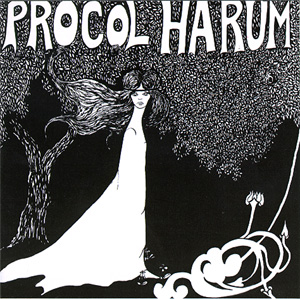
Procol Harum
Beyond |
|
|
|
|
This review was formerly printed at Epinions.com and is reproduced
by kind permission of the author, Jason
Thompson
When one thinks of Procol Harum, one may not think beyond A Whiter Shade Of Pale. For this tune, along with A Salty Dog, is usually the only song that gets played on the radio by this haunting group. Most would probably not even think of Procol Harum as a progressive rock group, but that's what they were. The difference between these guys and all the rest who went off to noodle with grandiose epics dolled up with synthesisers such as Rick Wakeman of Yes and Emerson, Lake, and Palmer was Procol Harum was far from being preciously self-important. This band had a wealth of talent.

Their first album, A Whiter Shade Of Pale, released in 1967, originally didn't even include that famous hit at all. Originally simply titled Procol Harum, the band had decided to leave the track off because they felt that it had merely been a single, a completely separate entity from the album. Eventually it was re-released with the song as the first track. Based on Bach's Suite Number 3 In D Major, the tune would become a timeless classic, based as much on the strange lyrics as the grand music itself.
Keith Reid was the man who wrote those lyrics, along with the rest of the songs on the album. Gary Brooker, pianist and singer of the group, put the memorable music atop Reid's lyrics. The partners created a set of ten stunningly surreal songs over the course of the album.
It's hard to assess the strange poetry that lies within songs such as She Wandered Through The Garden Fence. Or the beautifully vivid words of Something Following Me. These were songs drenched in their own brand of psychedelia. Words that seemed influenced more from an internal muse gone mad than any amount of LSD. Even if Something Following Me is an account of man's own mortality, it's conveyed in such an abstract light that the lyrics tend to mystify rather than explain away.
Straightforward rock was also part of the Procol canon. Both Conquistador and Kaleidoscope show a knack for heavy blues-tinged rock music that other progressive acts didn't seem to have. No doubt this was Robin Trower's gift, an exceptionally talented guitarist who would later go on to great solo success in the 70s.
A great deal of humour and jug band influence pops up in both Mabel and Good Captain Clack. Clack almost sounded as if it could have come from a Revolver era Beatles-inspired fit. Still, it's not derivative of anything else, thanks again to Reid's witty lyrics, which at times come across like short novellas more than song lyrics.
The surrealism rears its head again for Cerdes (Outside The Gates Of), A Christmas Camel, and Salad Days (Are Here Again). If Cerdes and its tale of the mythical place and its inhabitants didn't in one way or another wind up influencing Yes and their dozens of goofy epic rock tales, then it's a wonder. According to Brooker, A Christmas Camel was slightly inspired by Bob Dylan, although one listen to it, and you probably wouldn't know.
The album closes with Repent Walpurgis, an instrumental workout that the band often liked to close its live shows with. It may seem ironic to have ended the album with a wordless piece, as the rest of the songs all had something quite interesting to say. Yet it's just as moody and atmospheric as the other songs, and a fitting note to end on.
Of course, attention must be given to not only Reid, Brooker and Trower, but to the rest of the group as well. A Whiter Shade Of Pale is probably best known for that famous organ played at the beginning. The organist is Matthew Fisher, a perfect foil to Brooker's stately piano playing. BJ Wilson supplies the drumming and percussion. Wilson is indeed one of the most underrated drummers in classic rock. He would go on to supply his skills on such seminal 70s albums like Lou Reed's Berlin. And finally, on bass, is David Knights. A fluid bassist who held his own with the rest of the group, Knights is another overlooked figure of that instrument.
It's interesting to note that this album was never mixed in stereo. The US single of Pale was re-channeled into "fake" stereo, but the song and its accompanying album were always in mono from the beginning. Even the band couldn't tell you why this was done, as they had rehearsed all the songs for months. Yet when it came time to record them, they were done in monophonic.
This does not detract from the sound, however. At least not on my copy, which is an import on the Repertoire label. It also includes 4 bonus cuts. These include Lime Street Blues, Homburg, Monsieur Armand, and Seem To Have The Blues All The Time. All of these are added gems. They are tunes which would not have fit too well on the original album, but made for very interesting singles on their own.
If you're a fan of the surreal, A White Shade Of Pale is an excellent
addition to your music collection. Likewise, if you're a casual fan of
Procol's, yet you have no idea as what they were actually about, this would
make a great purchase. It's an album that hasn't dated a bit, for the lyrics
always sound fresh and the music is highly original. A Whiter Shade
Of Pale is certainly deserving of its place in classic rock.
| Read an eyewitness account of one recording session for this album | About the original release 'Procol Harum' |
| About the 'Plus' re-release of this album | More reviews of this album |
| Order this CD from Amazon UK |
|
|